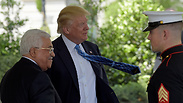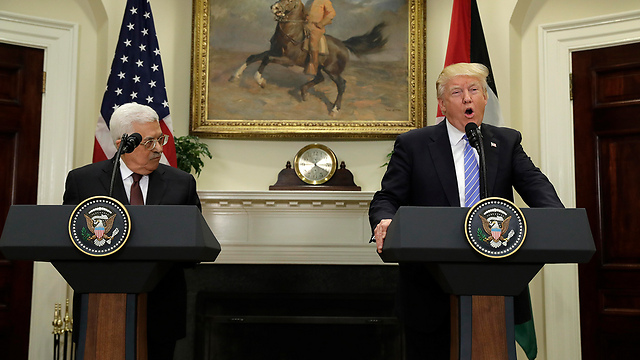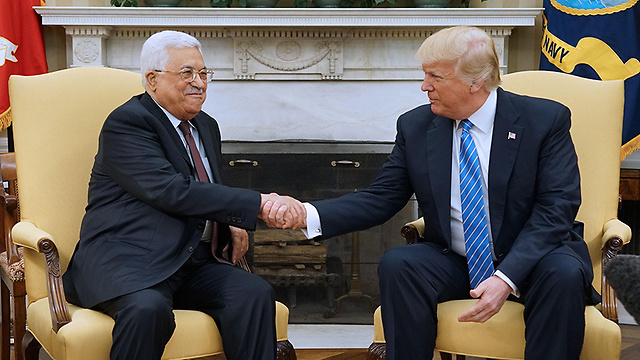
US President Donald Trump vowed to Palestinian Authority President Mahmoud Abbas on Wednesday that he will "do whatever is necessary" to negotiate a peace deal between Israel and the Palestinians.
The two met in Washington to discuss not just the Mideast peace process, but also improving the Palestinian economy and the issue of the PA's continued funding of the families of killed or convicted terrorists serving out a prison sentence in Israel.
Trump opened Wednesday's joint press conference with Abbas by reiterating his commitment toward brokering a peace deal between Israel and the Palestinians. He urged Abbas to work with his administration to acheiving this goal, before emphasizing that the US is ready to help the Palestinians develop and improve their economy.
"We will get this done," Trump promised, noting he will work as a "mediator, an arbitrator or a facilitator" to broker a deal between the warring sides.
The American president expressed his hope that while "there's such hatred, hopefully there won't be such hatred for very long," noting there is "a very, very good chance" of bringing Israel and the Palestinians together.
In his own remarks, Abbas focused on specific demands that the PA will be sticking to in talks with Israel: namely, a two-state solution with Jerusalem as the capital of a Palestinian state and Israel returning to its 1967 borders and ending its 50-year "occupation" of the Palestinian people.
Still, Abbas stated that he believes it is possible to reach peace between both parties, adding that "We are coming into a new opportunity, a new horizon that would enable us to bring about peace."
"I believe that we are capable under your leadership and under your courageous stewardship and your wisdom as well as your great negotiating ability ... I believe we can be partners—true partners to you—to bring about a historic peace treaty," Abbas said. "Now, Mr. President, with you we have hope."
According to US officials, Trump pressed Abbas on the issue of PA payments to terrorists and families of terrorists, as well as called on the Palestinian leader to put an end to anti-Israel rhetoric and incitement of violence.
But it wasn't all stick and no carrot. Trump reportedly recommitted the United States to helping the Palestinians improve their economic conditions. US officials said before the meeting that Trump was also going to reiterate his belief that Israeli settlement construction on land claimed by the Palestinians does not advance peace prospects.
The peace process has been stalled since 2014 when former Secretary of State John Kerry's effort to lead the sides into peace talks collapsed. Since then, there have been no serious attempts to get negotiations restarted. The Obama administration spent its last months in office attempting to preserve conditions for an eventual resumption.
"We hope this will be a new beginning," Abbas told Palestinians at a meeting in Washington on the eve of the talks.
He blamed the lack of dialogue in recent years on the Israeli government, saying its leaders "have no political vision," and reiterated his demands for an independent Palestinian state along pre-1967 lines, with east Jerusalem as its capital.
"Without this we will not accept any solution," said Abbas, who touted an Arab League peace plan that offers Israel diplomatic relations with the Muslim world for a Palestinian state. "There is no alternative."
Prime Minister Benjamin Netanyahu, who had his own very positive meeting with Trump back in February, has in the past emphatically rejected the 1967 lines as a possible border, saying it would impose grave security risks. During their joint press conference, Trump famously stated that he would be satisfied with either a one or two-state solution.
In comments made before his meeting with the American president, Abbas criticized ideas for a "one state" peace agreement, saying it could mean "racial discrimination" or an apartheid-like system. Left unspoken was the apparent reference to Trump.
Another contentious issue: Trump's campaign promise to move the US Embassy in Israel from Tel Aviv to Jerusalem. The symbolic relocation would essentially recognize Jerusalem as Israel's capital. Abbas and other Arab leaders have said doing so would inflame already simmering tensions.
Since taking office, Trump has backed away from the pledge while saying he's still discussing it. On Tuesday, Vice President Mike Pence said the White House was giving "serious consideration" to the idea.
In lieu of moving the embassy, some in the administration had floated the idea of the new US ambassador to Israel, David Friedman, living in Jerusalem instead of the official residence in Herzliya Pituach. Officials now say Friedman, who is expected to take up his post next week, will live at the residence.
Pence also said Trump was making progress toward peace, though he didn't elaborate. He stressed that Israel's interests would be protected.
"Thanks to the president's tireless leadership, momentum is building and good will is growing," Pence said at an event commemorating the anniversary of Israeli independence. "And while there will undoubtedly have to be compromises, you can rest assured: President Donald Trump will never comprise the safety and security of the Jewish state of Israel. Not now, not ever."


















